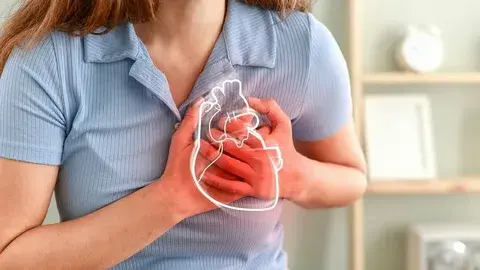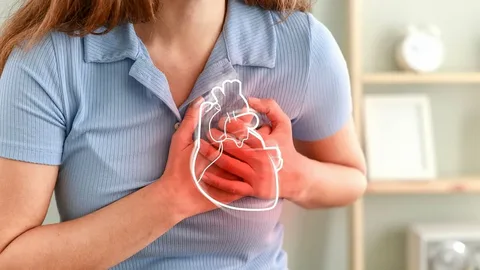We use cookies to personalise site content, social media features and to analyse our traffic. We also share information about your use of this site with our advertising and social media partners.
Posted by - DiseasesMedication -
on - Oct 2 -
Filed in - Health -
Am i having a heart attack female quiz -
411 Views - 0 Comments - 0 Likes - 0 Reviews

Am i having a heart attack female quiz? Heart disease remains the leading cause of death among women worldwide, yet many women still underestimate their risk. A major challenge is that heart attack symptoms in women often present differently than in men, making it harder to recognize the warning signs early. To bridge this gap, awareness tools such as an “Am I Having a Heart Attack? Female Quiz” can help women better understand their symptoms and decide when to seek medical care.
In this blog, we’ll dive into the importance of recognizing female-specific heart attack symptoms, explore how an online quiz can be useful, highlight common risk factors, and provide guidance on when to seek emergency help.
Am i having a heart attack female quiz? When most people think of a heart attack, they picture crushing chest pain and a dramatic collapse. While this is a common symptom in men, women often experience subtler or less classic warning signs. This difference often leads to delayed treatment, increasing the risk of complications.
Some of the reasons for these differences include:
Hormonal influences (especially estrogen) that affect how blood vessels function.
Microvascular disease, where smaller arteries in women become blocked, causing different pain patterns.
Misinterpretation of symptoms as stress, indigestion, or fatigue rather than a cardiac event.
Because of these differences, a simple self-assessment quiz can help women pause, evaluate their symptoms, and take timely action.
Before exploring the quiz format, it’s important to understand the most frequent symptoms reported by women:
Chest pain or discomfort – often mild or spreading across the upper body.
Shortness of breath – may occur with or without chest discomfort.
Nausea, vomiting, or indigestion-like feelings.
Pain in the neck, jaw, shoulders, or back.
Unusual fatigue – sometimes days or weeks before the attack.
Lightheadedness or dizziness.
Cold sweats.
Unlike men, women are more likely to experience non-chest pain symptoms such as jaw pain, fatigue, or stomach discomfort.
A quiz should never replace professional medical diagnosis, but it can be an eye-opening self-check tool for women. Below is a simplified version of what such a quiz might look like. If you answer “yes” to several questions, it’s a red flag to seek medical attention.
Quiz Questions
Are you currently experiencing chest discomfort, pressure, or tightness?
Do you feel pain in your jaw, neck, shoulders, or back?
Are you short of breath without much exertion?
Have you felt unusual fatigue that seems to appear suddenly or last for days?
Do you feel nauseated, lightheaded, or sweaty without a clear reason?
Are your symptoms worsening with physical activity but improving with rest?
Do you have a personal or family history of heart disease, high blood pressure, or diabetes?
Are you a smoker, overweight, or living with chronic stress?
Scoring Guidance
Yes to 1–2 questions: Your symptoms may be due to other causes, but do not ignore them. Monitor closely and consider contacting a doctor.
Yes to 3–4 questions: Your symptoms could be warning signs of heart trouble. Seek medical advice soon.
Yes to 5 or more questions: Call emergency services immediately. You may be experiencing a heart attack.
This type of quiz provides awareness and helps women understand when symptoms should not be ignored.
Knowing your risks can also guide how you respond to symptoms. The most common heart attack risk factors in women include:
High blood pressure
Diabetes
High cholesterol
Smoking
Obesity
Sedentary lifestyle
Family history of heart disease
Post-menopause (loss of estrogen protection)
Chronic stress or depression
By addressing these risk factors through lifestyle changes, medication, and regular checkups, women can significantly reduce their chances of experiencing a heart attack.
The quiz and awareness of symptoms are useful, but the most important takeaway is: Do not wait if you suspect a heart attack.
If you experience:
Chest discomfort lasting more than a few minutes
Sudden shortness of breath
Unexplained nausea, fatigue, or dizziness
Pain spreading to your arms, neck, jaw, or back
Call emergency services immediately (such as 911 in the U.S.). Never attempt to drive yourself if symptoms are severe.
Early treatment can prevent heart muscle damage, improve survival rates, and reduce complications.
Prevention remains the best cure. Women can take several proactive steps to protect their heart health:
Adopt a heart-healthy diet
Eat more fruits, vegetables, lean proteins, and whole grains while reducing saturated fats, sugar, and processed foods.
Stay physically active
Aim for at least 150 minutes of moderate exercise each week.
Quit smoking and limit alcohol
Smoking is one of the strongest predictors of heart disease in women.
Manage stress effectively
Chronic stress increases the risk of heart disease. Yoga, meditation, and breathing exercises help.
Get regular checkups
Routine screenings for blood pressure, cholesterol, and blood sugar can help catch problems early.
Health organizations and hospitals increasingly use online quizzes to educate women about heart attack symptoms. These interactive tools help women recognize warning signs they might otherwise dismiss.
For example:
Hospitals may provide heart attack risk assessment quizzes on their websites.
Health campaigns during American Heart Month or Go Red for Women initiatives often encourage women to learn their risk factors.
Social media outreach has made quizzes a quick, shareable way to raise awareness.
By combining education, self-check quizzes, and timely medical advice, women can significantly reduce heart attack-related deaths.
Am i having a heart attack female quiz? Women often face unique challenges when it comes to recognizing and responding to heart attacks. Because their symptoms are not always “classic,” many delay seeking help—sometimes with fatal consequences. An “Am I Having a Heart Attack? Female Quiz” can be a valuable self-assessment tool, encouraging women to pause, evaluate their symptoms, and act quickly when needed.
However, no quiz replaces professional medical care. If you suspect you may be having a heart attack, do not wait—seek emergency treatment immediately. At the same time, adopting a heart-healthy lifestyle, managing risks, and staying informed are powerful steps women can take to protect their hearts.
Heart health is not just about adding years to your life—it’s about adding life to your years. Stay informed, listen to your body, and never ignore warning signs.

“To assist disaster survivors by providing a source for them to come together in time of need, to aid in the listing of events, information and other forms of assistance, and continuing support through the recovery process.”
Share this page with your family and friends.